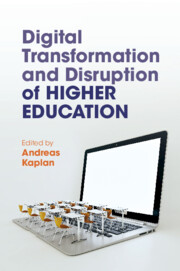Book contents
- Digital Transformation and Disruption of Higher Education
- Digital Transformation and Disruption of Higher Education
- Copyright page
- Contents
- Figures
- Tables
- Contributors
- Preface
- Chapter 1 Nothing Is Constant Except Change
- Part I (R)evolution of the Higher Education Sector
- Part II Changes in Teaching Formats
- Part III Changes in Teaching Content
- Part IV Networking and Social Activities
- Part V Certification and Diplomas
- Part VI Careers and Professionalisation
- Part VII Futuristic and Ultramodern Higher Education
- Part VIII Higher Education in Motion
- Chapter 30 Higher Education in Motion
- Editor’s Biography
- Index
- References
Chapter 30 - Higher Education in Motion
Its Transformation and Potential Disruption
from Part VIII - Higher Education in Motion
Published online by Cambridge University Press: 09 June 2022
- Digital Transformation and Disruption of Higher Education
- Digital Transformation and Disruption of Higher Education
- Copyright page
- Contents
- Figures
- Tables
- Contributors
- Preface
- Chapter 1 Nothing Is Constant Except Change
- Part I (R)evolution of the Higher Education Sector
- Part II Changes in Teaching Formats
- Part III Changes in Teaching Content
- Part IV Networking and Social Activities
- Part V Certification and Diplomas
- Part VI Careers and Professionalisation
- Part VII Futuristic and Ultramodern Higher Education
- Part VIII Higher Education in Motion
- Chapter 30 Higher Education in Motion
- Editor’s Biography
- Index
- References
Summary
So as not to face potential disruption, universities will need to actively engage in the sector’s evolution as opposed to passively observing its revolution. To stay competitive, they will need to adapt pedagogy and content to ongoing changes lest they risk their irrelevance. They are advised to create occasions for relationship and community building, fostering students’ affection for and attachment to their alma mater, and to avoid the university’s being abstract in students’ minds. Instead of the current standard of one-time, early-life degrees (intermittence), lifelong learning and persistence over alumni’s entire professional careers appear to be academia’s model for the future. Universities must assure higher applicability of taught material to job requirements, as employers are increasingly launching own corporate universities offering nano- and micro-degrees. Finally, affiliation with edtech start-ups and big tech companies might be necessary to ensure the funding needed to navigate academia’s new online reality and thus bypass isolation.
Keywords
- Type
- Chapter
- Information
- Digital Transformation and Disruption of Higher Education , pp. 407 - 412Publisher: Cambridge University PressPrint publication year: 2022
References
- 1
- Cited by



